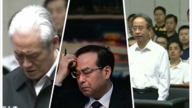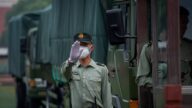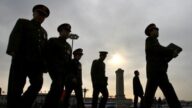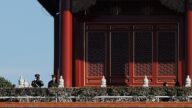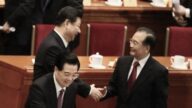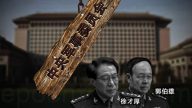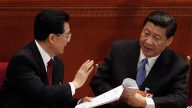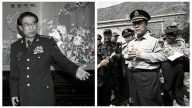【新唐人2014年07月24日訊】日前網路上廣泛流傳,前中共軍委副主席郭伯雄化妝成女性出逃,在海關被攔截的消息。週日,大陸警方刑拘兩名網民,並處罰了另外37人,聲稱他們涉嫌在網上編造相關謠言。
7月20號,黨媒《新華網》引述公安部門消息說,7月15號,北京一名馬姓網民、和海南裴姓網民,先後在《新浪微博》發佈:「上海進出航班全面延誤,是因為在抓某人,為了防止某人跑掉或者頑抗,就以軍事演習為名,把機場給封鎖了。」
報導說,公安機關已經刑事拘留了馬某、裴某,並對37名網民作治安處罰和教育訓誡。
不過事實上,從6月30號中共軍委前副主席徐才厚落馬後,網路就傳開,中共已經針對和徐才厚同一級別的另一只軍中「大老虎」——郭伯雄收網。
到了7月15號,網路上有關「郭伯雄女裝出逃」的消息更多,還廣泛流傳一篇「G將軍出逃記」,裡面詳細描述郭伯雄出逃的時間,和班機。
時事評論員黃金秋指出,所謂的「謠言」主要是因為中共政治上暗箱操作、新聞不自由造成的。
時事評論員黃金秋:「很多信息它說是謠言,但是我們發現謠言往往變成了遙遙領先的預言,從最開始王立軍出逃成都美國領事館,到後來薄熙來的事情,包括他老婆殺害英國人的事情,包括後來周永康政變的事情,現在都是一步一步的被證實。」
原《河北人民廣播電臺》編輯朱欣欣則表示,近一段時間以來,各種詭異的政治謠言滿天飛,但基本上是中共高層在內鬥中,互相「放風」,用來打擊對方的。
原河北人民廣播電臺編輯朱欣欣:「習近平反腐以來,也引起了內部貪官的恐慌,所以各種複雜的情況也都是層出不窮。這樣有意無意的,就可以從內部傳播出來種種的信息,可是這種信息傳播出來經過了很多人的口,輾轉以後肯定會有失真或者是走樣的現象。」
除了郭伯雄出逃的消息外,近期還有「曾慶紅被調查」,「宋祖英被抓捕」,「賈慶林在內蒙被控制」,以及眾多貪腐官員遭抓捕等等消息,在網絡流傳。
朱欣欣分析,目前中共再次借「傳謠」抓捕網民,主要是對民間傳播中共內部權鬥行為的惱火。
朱欣欣:「中共內部的,還有中共外部的,社會的矛盾越來越尖銳,衝突越來越尖銳,各種情況又得不到真正的報導,藉著民意的渠道就擴散開來,這是謠言的一個重要的原因,它打壓這個『謠言』也是為了對民眾進行恐嚇,達到震懾民意的作用。」
郭伯雄出逃的消息傳出後,中共「互聯網信息辦公室」在7月17號晚間,通過《新華網》發消息,聲稱對31家所謂「謠言」比較集中的網站,給予關閉整改處罰。
事實上,今年以來,當局已經對網絡言論進行了一系列的嚴格控制,不僅在2月正式成立了「網路安全和信息化領導小組」,由中共黨魁習近平親任網路安全組組長。還在5月,由「互聯網信息辦公室」聯合工信部、公安部,在全國範圍內,開展了一個月的所謂「即時通信工具專項治理行動」。當時,通信企業也宣稱,要建立專門的「闢謠隊伍。」
黃金秋:「在中國,缺乏一個自由的民主監督,缺乏輿論自由的環境下,所謂的謠言是不是謠言?在網民心中肯定是一桿秤的,換句話說,有些東西你不去澄清、去公開,那些網民他們就會從不同的渠道得到一些其他的信息,然後互相印證,變成了一種間接的輿論監督。」
2013年的中國,被輿論稱作「言論管控最嚴厲」的一年。從中國門戶網站到報紙雜誌,從傳統通信平臺到新興社交平臺,從大V、名人到公知、記者,都遭到中共不同程度的打壓。
據中共今年1月份的數據顯示,中共在去年所謂的「淨網」專項行動中,查處了1萬多家所謂的違規網站,抓捕了1萬1千多人。
採訪編輯/李韻 後製/李勇
39 Netizens Arrested for Rumors of Runaway Chinese General
Rumors have been spreading online that Guo Boxiong,
former vice chairman of China’s Central Military Commission,
has recently disguised himself as a woman
and attempted to flee China, only to be intercepted at customs.
On Sunday, mainland Chinese police had placed two netizens
under criminal detention and penalized 37 others
on charges of allegedly fabricating online rumors.
On July 20, Communist Party mouthpiece Xinhua quoted
the police department as saying that a netizen surnamed Ma
in Beijing and a netizen surnamed Pei in Hainan both made
similar posts on Weibo, a Chinese website similar to Twitter.
They said that all incoming and outgoing flights in
Shanghai were delayed because they were catching someone,
and in order to prevent that person from fleeing or resisting,
they locked down the airport in the name of military exercises.
The Xinhua report says that the public security department
had placed both Ma and Pei under criminal detention,
and issued penalties and admonishment to 37 other netizens.
In fact, since Xu Caihou, another former Vice Chairman
of the Central Military Commission, was sacked on June 30,
online rumors were already claiming that the regime
had caught another ‘big tiger’ with Xu’s rank in the military:
Guo Boxiong.
By July 15 there were more online rumors about Guo
disguising himself as a woman and fleeing the country.
A story called, “The Great escape of General G" was widely
spread on the internet, detailing Guo’s escape,
including the time and the flight number.
Commentator Huang Jinqiu says that the so-called ‘rumors’
are the results of CCP’s opaque political operations
and lack of press freedom.
Huang Jinqiu: “A lot of information was labeled as rumors,
but many of them often turned out to be accurate predictions.
From the incident of Wang Lijun fleeing to the U.S. embassy
in Chengdu, to the incident of Bo Xilai, including the murder
of Neil Heywood by Bo’s wife, to Zhou Yongkang’s coup plot,
step by step, all of these were later proven to true."
Zhu Xinxin, the former editor of Hebei People’s Radio says
that a variety of strange political rumors have been circulating
in recent times, but many of them were leaked by top level
CCP officials amid their infighting.
Zhu Xinxin: “Xi Jinping’s anti-corruption campaign
has caused the internal corrupt officials to panic,
hence there were so many complicated situations.
This has caused a lot of intentional or unintentional
information leaks from insiders.
This kind of verbal information could be distorted.
Other widely spread online rumors are that former politburo
member Zeng Qinghong is being investigated,
singer Song Zuying was arrested, Jia Qingling is jailed in Inner
Mongolia, and many other corrupt officials are being arrested.
Zhu Xinxin says that the main reason the CCP is arresting
netizens again in the name of suppressing rumors
is to unleash its anger towards the news of its internal
power struggles being spread widely among the people.
Zhu Xinxin: “The conflicts within the CCP
and in the society are becoming increasingly acute.
But none of this is being truthfully reported on.
[The information] gets passed on through word of mouth
and thus rumors are formed.
The purpose of ‘suppressing rumors’ is to intimidate people,
in order to deter public opinion."
Since the news of Guo Boxiong’s escape was released,
the CCP’s Internet Information Office announced via Xinhua
that 31 websites with relatively more so-called ‘rumors’
would face being shut down and rectified.
In fact, authorities have enforced a series of strict controls on
online speech since this year.
The “Internet Security and Information Technology Leading
Group" was formed in February led by president Xi Jinping.
In May, the Internet Information Office,
the Ministry of Industry and the Public Security Department
jointly carried out a so-called “Special Rectification Campaign
on Instant Communication Tools" nationwide for a month.
At that time, communications companies also claimed
to establish “special teams" of individuals to refute rumors.
Huang Jinqiu: “There is lack of free and democratic
supervision or freedom of public opinion in China.
Are the so-called rumors really rumors?
Netizens definitely have their own judgment and standards.
If the government won’t clarify or disclose something,
then netizens will get the information from other sources,
then confirm with each other, and this becomes a kind of
indirect supervision by public opinion."
Many people say the year 2013 saw the most severe control
of speech in China.
From China’s web portals to newspapers and magazines,
from traditional communication platforms to emerging social
media platforms, from popular bloggers to celebrities
and reporters, all of them experienced the CCP’s suppression.
According to CCP’s data from January,
during the so-called “Clean the Internet" campaign last year,
more than 10,000 so-called illegal websites were investigated
and more than 11,000 people were arrested.
Interview & Edit/LiYun Post-Production/LiYong


